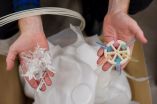New approach can predict impact of climate change on species that can't get out of the way
2014-10-01
(Press-News.org) CUMBERLAND, MD (October 1, 2014)--When scientists talk about the consequences of climate change, it can mean more than how we human beings will be impacted by higher temperatures, rising seas and serious storms. Plants and trees are also feeling the change, but they can't move out of the way. Researchers at the University of Maryland Center for Environmental Science and University of Vermont have developed a new tool to overcome a major challenge of predicting how organisms may respond to climate change.
"When climate changes, organisms have three choices: migrate, adapt, or go extinct," said lead author Matt Fitzpatrick of the University of Maryland Center for Environmental Science's Appalachian Laboratory. "We're bringing the ability to quantify that adaptation piece that had largely been missing up to this point."
Organisms are adapted to live in certain environments and not others. However climate change is forcing them to live in climates to which they may not be well adapted. Animals can move around, but things like plants and trees are rooted in the ground and must withstand climate change or die.
Scientists have combined genetic analyses with new modeling approaches for the first time to help identify how well balsam popular trees are adapted to handle climate change. The scientists sampled the genetic code of 400 trees from 31 locations across northern North America and combined the genetic variations with computer modeling techniques to map how important genes differ within balsam poplar and to locate where trees may have the best chance of survival in a rapidly warming world.
Up until now, scientists have sought to quantify the risk of climate change to different species by mapping where those species occur today based on climate and then predicting where they may occur in the future. For instance, models for North American tree species often predict them to occur further north as climate warms.
"The problem with the approach is you're assuming all individuals within a species are identical, like assuming all humans will respond identically to an illness," said Fitzpatrick. "Some will respond differently given different genetic backgrounds.
It turns out that all members of a species won't react the same way to climate change. Some poplar trees are already adapted genetically to handle climate changes expected over the next few decades while others are not--just like some people a more likely to survive a disease than others.
Increasingly local adaptation to climate is being studied at the molecular level by identifying which genes control climate adaptation and how these vary between individuals. This type of modeling of variation in genetic makeup represents an important advance in understanding how climate change may impact biodiversity.
"We've developed the techniques to associate genetic variation to climate and to map where individuals may and may not be pre-adapted to climates expected in the future," said Fitzpatrick. "It's important to know where these places are. This gives us a way to link climate responses more closely to the biology than we were able to do previously."
INFORMATION:
The study, "Ecological genomics meets community-level modeling of biodiversity: mapping the genomic landscape of current and future environmental adaptation," was published by Matthew Fitzpatrick of the University of Maryland Center for Environmental Science and Steven Keller of the University of Vermont. It appeared in the October 1 issue of Ecology Letters.
University of Maryland Center for Environmental Science
The University of Maryland Center for Environmental Science is the premier research and educational institute working to understand and manage our world's natural resources. A network of four regional laboratories–the Appalachian Laboratory in Frostburg, the Chesapeake Biological Laboratory in Solomons, the Horn Point Laboratory in Cambridge, and the Institute of Marine and Environmental Technology in Baltimore–respond to today's most pressing environmental concerns, using cutting-edge science to discover solutions to challenges in the Chesapeake Bay and around the world and to educate the next generation of science leaders. http://www.umces.edu
[Attachments] See images for this press release:

ELSE PRESS RELEASES FROM THIS DATE:
2014-10-01
BUFFALO, N.Y. — If a person is dually diagnosed with a severe mental illness and a substance abuse problem, are improvements in their mental health or in their substance abuse most likely to reduce the risk of future violence?
Although some may believe that improving symptoms of mental illness is more likely to lessen the risk for future episodes of violence, a new study from the University at Buffalo Research Institute on Addictions (RIA) suggests that reducing substance abuse has a greater influence in reducing violent acts by patients with severe mental illness. ...
2014-10-01
New Rochelle, NY, October 1, 2014—Regulation of the human immune system's response to infection involves an elaborate network of complex signaling pathways that turn on and off multiple genes. The emerging importance of long noncoding RNAs and their ability to promote, fine-tune, and restrain the body's inflammatory response by regulating gene expression is described in a Review article in Journal of Interferon & Cytokine Research (JICR), a peer-reviewed publication from Mary Ann Liebert, Inc., publishers. The article is available free on the JICR website.
In the Review ...
2014-10-01
COLUMBIA, Mo. – Relational aggression, or "mean girl" bullying, is a popular subject in news and entertainment media. This nonphysical form of aggression generally used among adolescent girls includes gossiping, rumor spreading, exclusion and rejection. As media coverage has illustrated, relational aggression can lead to tragic and sometimes fatal outcomes. Despite these alarming concerns, little has been done to prevent and eliminate these negative behaviors. Now, University of Missouri researchers have developed and tested an intervention that effectively decreases relational ...
2014-10-01
This news release is available in French and Spanish. The Commission for Environmental Cooperation (CEC) has released a comprehensive report on the changing face of industrial pollution in North America, covering the years 2005 through 2010. This is the first time an edition of the CEC's Taking Stock series, which gathers data from pollutant release and transfer registers (PRTRs) in Canada, Mexico and the United States, has analyzed North American pollutant information over an extended timeframe. To view the report, visit http://www.cec.org/library.
This volume ...
2014-10-01
Biological sensors, or biosensors, are like technological canaries in the coalmine. By converting a biological response into an optical or electrical signal, they can alert us to dangers in our external and internal environments. They can sense toxic chemicals and particles in the air and enzymes, molecules, and antibodies in the body that could indicate diabetes, cancer, and other diseases.
An optical biosensor works by absorbing a specific bandwidth of light and shifting the spectrum when it senses minor changes in the environment. The narrower the band of absorbed ...
2014-10-01
It's old news that open-source 3D printing has a lot going for it: it's cheap, green and incredibly useful for making everything from lab equipment to chess pieces. Now it's time to add another star to the 3D printing constellation. It may help lift some of the world's most destitute people from poverty while cleaning up a major blight on the earth and its oceans: plastic trash.
At the center of the movement is a new set of standards inspired by fair trade products ranging from diamonds to chocolate.
"We are creating a new class of material called ethical 3D printing ...
2014-10-01
Washington, D.C., October 1, 2014—Use of specific dietary supplements can have a positive effect on health care costs through avoided hospitalizations related to Coronary Heart Disease (CHD), according to a new article published in the Journal of Dietary Supplements(1). The article, "From Science to Finance—A Tool for Deriving Economic Implications from the Results of Dietary Supplement Clinical Studies," published by Christopher Shanahan and Robert de Lorimier, Ph.D., explores a potential cost-benefit analysis tool that, when applied to a high-risk population (U.S. adults ...
2014-10-01
Reston, Va. (October 1, 2014) – Researchers at Memorial Sloan Kettering found that PET/CT imaging of patients younger than 40 who were initially diagnosed with stage I–III breast cancer resulted in change of diagnosis. As reported in the October issue of The Journal of Nuclear Medicine, while guidelines recommend FDG-PET/CT imaging only for women with stage III breast cancer, it can also help physicians more accurately diagnose young breast cancer patients initially diagnosed with earlier stages of the disease.
Assessing if and how far breast cancer has spread throughout ...
2014-10-01
As the threat of antibiotic resistance grows, scientists are turning to the human body and the trillion or so bacteria that have colonized us — collectively called our microbiota — for new clues to fighting microbial infections. They've logged an early success with the discovery of a new antibiotic candidate from vaginal bacteria, reports Chemical & Engineering News (C&EN), the weekly newsmagazine of the American Chemical Society.
Matt Davenport, a C&EN contributing editor, explains that the human microbiota produces thousands of small molecules. Some have been discovered ...
2014-10-01
Here's another reason why it's a good idea to hit the gym: it can improve memory. A new Georgia Institute of Technology study shows that an intense workout of as little as 20 minutes can enhance episodic memory, also known as long-term memory for previous events, by about 10 percent in healthy young adults (see a video demo).
The Georgia Tech research isn't the first to find that exercise can improve memory. But the study, which was just published in the journal Acta Psychologica, took a few new approaches. While many existing studies have demonstrated that months of ...
LAST 30 PRESS RELEASES:
[Press-News.org] New approach can predict impact of climate change on species that can't get out of the way



